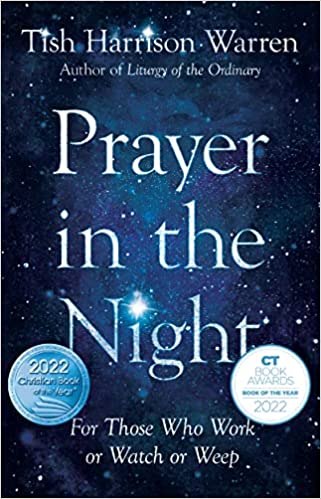Tonight we are discussing Chapter 6 “Give Your Angels Charge Over Those Who Sleep: Cosmos and Commonplace” of the Rev. Tish Harrison Warren’s book Prayer in the Night: For Those Who Work or Watch or Weep. If possible, please read this chapter slowly and take the time to ruminate upon and think through her message.
The Prayer:
Keep watch, dear Lord, with those who work, or watch, or
weep this night, and give your angels charge over those who
sleep. Tend the sick, Lord Christ; give rest to the weary, bless
the dying, soothe the suffering, pity the afflicted, shield the
joyous; and all for your love’s sake. Amen.
1979 BCP 134
Nature of Sleep:
Rev. Warren asks us to think about the nature of sleep. Sleep is one of the few (maybe the only) activity that we cannot force ourselves to do. “‘You cannot make yourself sleep. You cannot force yourself to sleep.’” p.90. At least in my experience, the more you try to force sleep, the less likely it is to occur. Rather, sleep is an exercise in surrender. In order to sleep, we must first surrender our will to allow sleep to occur.
Sleep is also a time when we are the most vulnerable. When we sleep, we can more easily be harmed personally. At sleep, we lack the ability to respond to threats of any kind. To paraphrase Jesus, if the householder knew when the thief was coming, he would not be asleep. Matt. 24:43. To surrender to sleep is to surrender to vulnerability, which is why sleep can be difficult.
Even though sleep requires the surrender of the will and an entering into vulnerability, sleep is that time necessary for growth. The will may have surrendered, but the mind is active. Unencumbered by sensory information and higher thought processing, at sleep, the mind is available to see connections and solve problems that remain unresolved. (See, Sleep to Solve a Problem.) Sleep is also a time when memories are consolidated and stored and when learning can take place. Without sleep, our short-term memories would rapidly fill up. (See, Impact of Sleep on Learning and Memory.) And all of this happens without our knowledge, consent, or control. We grow in understanding only once the will has been surrendered.
Sleep and Death:
Jesus (Matt. 9:24, John 11:11) and Paul (1 Cor. 15:18, 1 Thess. 4:13) speak of death as a kind of sleep. Therefore, this connection between death and sleep helps us to understand Paul’s teachings about dying to Christ (Rom. 6:4, Gal. 2:20, Col. 3:3) or Rev. Capon’s writings that Jesus only came for the dead. Like sleep, the Christian life calls us to surrender our will and calls us to take on being vulnerable. Because, like in sleep, the benefits of this dying allow us to grow spiritually and to see and make connections that we otherwise would completely fail to achieve or notice. Rev. Warren invites us to see how the daily act of going to sleep is a spiritual practice of dying in Christ. The benefits of sleep come about when we surrender our own will, and the same is achieved in Jesus.
Guardian Angels:
The Prayer acknowledges that as we enter into sleep, that an enchanted universe full of angelic beings have charge over us as we surrender our will and enter into the vulnerability of sleep. Traditionally, however, it is not the full company of heaven that keeps watch over us, but a specific angelic being assigned to us. The Roman Catechism holds that “From infancy to death, human life is surrounded by their watchful care and intercession. ‘Beside each believer stands an angel as protector and shepherd leading him to life.’” Catechism §336. And in the Orthodox Church, Morning Prayer has a specific prayer to your guardian angel. As we see in the gospels, Jesus himself states that each of us has an angel that stands in the company of God. Matt. 18:10. Therefore, in the prayer we also individually ask for the protection of that individual angel who watches over us.
Questions and Practices:
Rev. Warren’s suggested questions and practices for chapter 6 are:
1. Have you ever encountered anything unexplained, or a spiritual being-an angel, a ghost, a demon? How is the supernatural regarded in your current circles? How was it regarded in your circles growing up?
2. The author says that prayer often precedes belief. Was there a time that prayer or another spiritual practice preceded belief for you or for your children?
3. What are your sleep habits like? Have you ever figured out a problem you were struggling with or had a concept become clear after you slept?
Dinner is at 6. The menu is a special Valentine’s Day dinner of tenderloin, crabcakes, and roasted Brussels sprouts. RSVP Required. Discussion about 7. Compline at 8.
O Angel of God, my holy Guardian, keep my life in the fear of Christ God, strengthen my mind in the true way and wound my soul with heavenly love, so that guided by Thee, I may obtain the great mercy of Christ God. Amen.
Canon to the Guardian Angel

